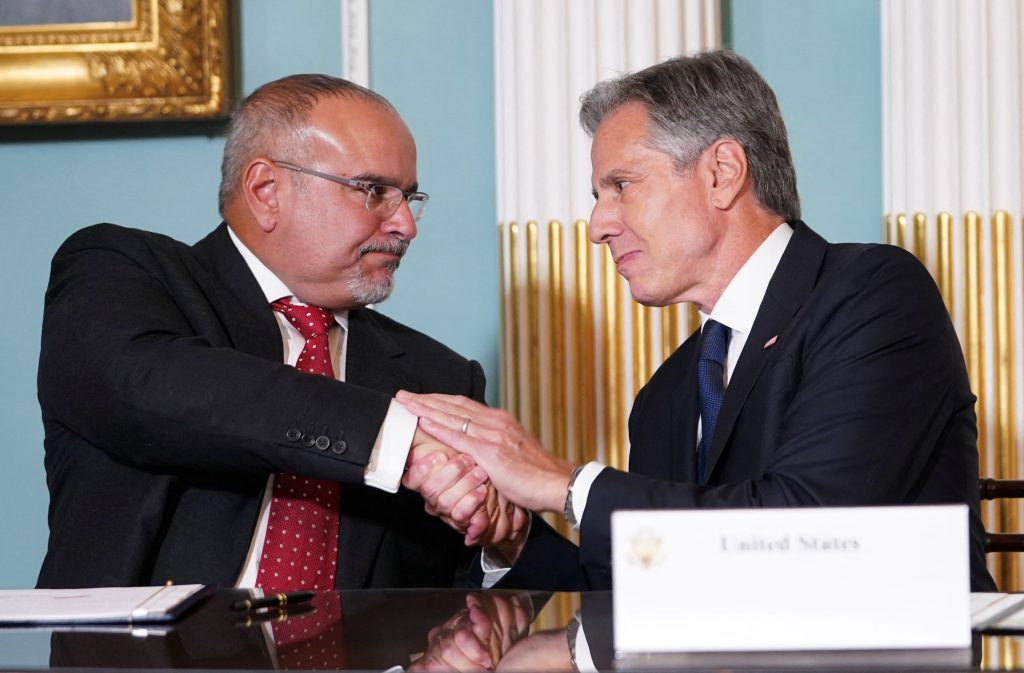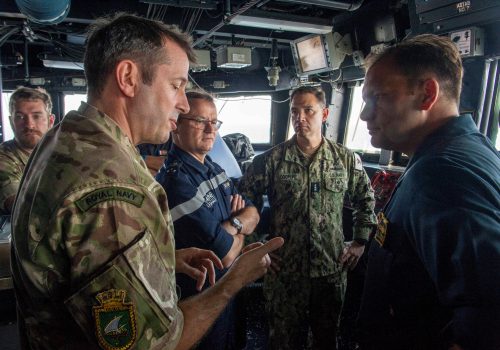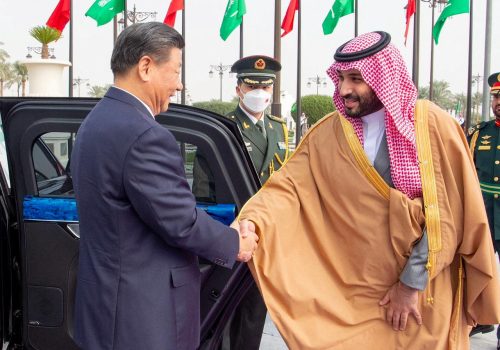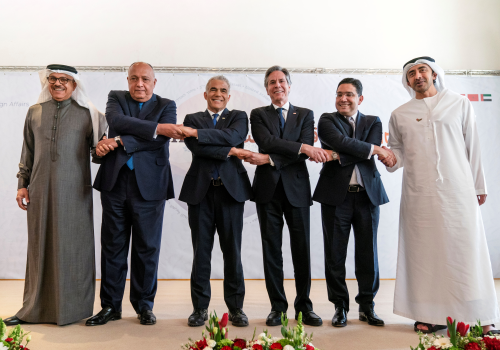The strategic cooperation agreement signed today by Bahrain and the United States has taken many observers by surprise. While all eyes were focused on the ongoing saga of a possible US-Saudi-Israel deal, Washington and Manama were quietly negotiating a strengthening of the United States’ commitment to the region that will have far-reaching consequences for the Gulf and beyond.
Bahrain and many of its neighbors have long desired more dependability and predictability from the United States—not just with respect to the threat posed by Iran, but as a partner on whom they can count on through thick and thin. From the perspective of some Arab allies, Washington waxes hot and cold. Today’s administration may shower you with solicitous attention while its successor treats you as a pariah or slow-walks bilateral cooperation on issues of strategic importance.
Underlying this disparity between expectations (from Arab leaders) and reality (the United States’ mercurial embrace) is a fundamentally flawed logic employed by many in Washington: that the Arab states of the Gulf need the United States—its arms, troops, technology, and markets—more than the United States needs them. The truly precedent-setting aspect of this agreement is the implicit recognition by the United States that this logic no longer holds.
Give the Biden administration credit: It has learned, adapted, and forged new policies that will remake the modern Middle East. In the legally binding agreement, the United States commits to consult and provide assistance if Bahrain faces an imminent security threat. Never before has the United States gone so far in extending such a security pledge to an Arab state. As US Secretary of State Antony Blinken explained, the pact will also “strengthen the coordination between our armed forces and the integration of our intelligence capacities.” Those who emphasize that the agreement falls short of a NATO Article 5-style security guarantee miss the point. A new bar has been set, a new standard established from which there is no walking back. This US-Bahrain pact will serve as the framework and basis for all future agreements with other regional powers—and they are coming, make no mistake.
Why Bahrain and why now?
Sensing that the time was right, Bahrain’s leaders initiated talks on this deal more than a year ago. The government there had long desired to take its historically close relationship with the United States to the next level. Bahrain was the first state in the region to host a major US military base on its territory (Naval Forces Central Command); first to sign a free trade agreement with the United States; and first to be accorded major non-NATO ally status. Yet a combination of evolving threats in the region and the pressures of globalization made it imperative to codify an even more robust partnership.
The Abraham Accords gave further momentum to this thinking. The rapid and comprehensive cooperation between Israel and the Arab nations of the Gulf had created a new strategic reality that produced new opportunities and possibilities. Bahrain was determined to seize these opportunities.
For the United States, the path to yes was considerably more circuitous. US President Joe Biden and his foreign policy advisors entered office understandably wary of deeper Middle East entanglements. During the 2020 campaign, Jake Sullivan, the future national security advisor and top negotiator of the deal with Bahrain, had presciently written in Foreign Affairs with Daniel Benaim that
“[A]s much as US interests in the Middle East have changed, that does not mean the United States can, will, or should leave the region outright. Instead, it should lead with diplomacy to set the conditions that will ultimately allow for sustained reductions in its military presence, while safeguarding important interests in a region that still matters for the United States and will for years to come.”
Two and half years into his term, Biden has come to appreciate more fully not only the centrality of the Gulf to US national interests but the need for greater reciprocity as well. The 2021 evacuation of Afghanistan, the contretemps with Saudi Arabia over oil production in October 2022, the failure of nuclear negotiations with Iran, and the intensifying competition with China have impressed upon US policymakers the importance of not taking its Gulf partners for granted. This has resulted in a drive to formalize the interdependent nature of their relationships.
That the United States chose Bahrain as the first regional partner with whom to conclude such a pact should come as no surprise. None of the other Gulf Cooperation Council countries offers a similar combination of strategic significance and political compatibility.
Strategically, Bahrain is the central node of the international maritime presence securing the world’s most important choke points. It is also the country to whose territory Iran lays the most expansive and longstanding historical claim and where the Islamic Republic conducts some of its most aggressive destabilization efforts. An island state not much larger than Manhattan lying just off the coast of Saudi Arabia, Bahrain’s size and geography make it an inviting target. Ras Tanura is Saudi Arabia’s largest oil exporting terminal; it is less than forty miles from the coast of Bahrain. The adjoining Eastern Province hubs of Dammam, Al Khobar, and Al Jubail collectively account for the large majority of Saudi Arabia’s total oil and petrochemical production capacity. With an estimated 9.7 million commercial vehicles crossing annually, the King Fahd Causeway is one of the busiest land border crossings in the Middle East.
Politically, Bahrain stands four-square with the United States on the issues of greatest importance to Washington. It has always been a steadfast, reliable ally on whom the United States could count, and the past few years have proved no exception. Unlike some of its neighbors, Manama has not made a show of hedging its bets by cozying up to China or striking deals with Russia. Its economy, outlook, and foreign policy are as close to 100 percent aligned with Washington as anyone.
What comes next? Look for other Arab countries to follow suit, either by signing on to the US-Bahrain pact or by negotiating separate agreements that will build on this precedent. Either way, Bahrain, as it has done so often in the past, has led the way by showing others what imagination and determination can accomplish.
Adam Ereli was the US ambassador to Bahrain from 2007 to 2011. He is currently CEO of IberoAmerican Group, a strategic advisory firm.
Further reading
Tue, Jun 20, 2023
The way for the US to ensure Gulf security is through partnership, not policing
MENASource By
As the United States continues to work with the Gulf on security, expect blips. Despite that, Washington can get this partnership back on course.
Wed, Apr 5, 2023
China is getting comfortable with the Gulf Cooperation Council. The West must pragmatically adapt to its growing regional influence.
MENASource By Joseph Webster, Joze Pelayo
The US and its allies and partners must pragmatically adapt to China’s growing regional influence by providing credible alternatives to Beijing.
Wed, Jul 5, 2023
The minilateral moment in the Middle East: An opportunity for US regional policy?
Issue Brief By Jean-Loup Samaan
Jean-Loup Samaan analyzes how regional powers in the Middle East are reconsidering the multilateral balance of their foreign policy arrangements.
Image: US Secretary of State Antony Blinken shakes hands with Bahraini Crown Prince Salman bin Hamad al-Khalifa during a signing ceremony for a Security Integration and Prosperity Agreement at the State Department in Washington, on, September 13, 2023. REUTERS/Kevin Lamarque



